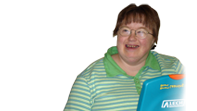Nowhere Else to Turn: Home Safety and Comfort for People with Disabilities and Their Caregivers
| DE-Center for Disabilities Studies, UCEDD/LEND | |||
| Program Type | LEND,UCEDD | Fiscal Year | 2020 |
| Contact | Beth Mineo | ||
| [email protected] | |||
| Phone | 302-831-6974 | ||
| Project Description | |||
|
Without the supports afforded by assistive technologies, many individuals are precluded from leaving their homes, navigating the community, interacting effectively with others, learning to their fullest potential, gaining and maintaining employment, managing their finances, caring for their personal needs, and pursuing recreational and leisure activities. Restrictions on access to AT are illogical, counterproductive, and often of questionable legality. Families, already strained by financial, physical, and emotional stressors, often do not have the awareness of what is possible with technology-related supports and do not have the knowledge, skills, or energy to fight a barrier-ridden system to get those supports. In Delaware, there are certain types of AT--most notably sensory AT, environmental controls, home modifications and vehicle modifications--that are not covered by insurance, and that are only covered by state agencies or other organizations for narrowly-defined populations. Our target population is comprised of individuals with paralysis-causing conditions who do without the AT they need because there are NO funding sources that will pay for it. This project focuses on home life, and the access and safety challenges that individuals with disabilities--and often their family members--encounter due to accessibility challenges of their residence or difficulties they have in engaging with home routines such as eating, bathing, dressing or enjoying leisure pursuits. The program provides home modifications and assistive technology to eliminate such barriers for individuals who are unable to live safely and comfortably in their homes due to an issue related to a paralysis-causing condition and who have exhausted their search for funding from other sources. Being a last resort fund, applicants have to demonstrate that they have sought support for needed AT and home modifications from other sources and been denied. This condition of eligibility is important for two reasons. First, we want to maximize the impact of program funds, so we want to avoid supplanting the responsibility of state agencies and organizations with foundation funds. Second, we believe that the stories of individuals assisted by this program will be critical in catalyzing systems change. We chronicle the lengths that families went to secure needed AT and home mods before they receive assistance from the program, and these stories collectively point out the gaps in our service system. That illumination of the gaps, and their impact on individuals and families,serves as compelling justification for systems change. |
|||







